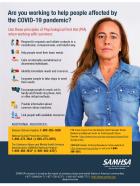This guide provides staff with knowledge and strategies to best support diverse rural communities. It considers risk factors, strengths, and common disaster reactions unique to rural communities to support best practices for ensuring disaster resilience and recovery.
Dashboard: Filter Bricks
Main page content


This guide focuses on research supporting adaptations of evidence-based practices (EBPs) for under-resourced populations. Adaptations involve tailoring care, programs, and services to the cultural, social, gender, and demographic contexts of the people served to yield positive outcomes.

This report provides findings from a qualitative analysis of evidence-based and culturally relevant behavioral health practices offered at NNEDLearn, a SAMHSA training, offered from 2011 to 2020. It includes an overview of NNEDLearn, case studies, strategies and lessons learned, and conclusion.



This tip sheet explores stress and compassion fatigue, as well as signs of distress after a disaster. It identifies ways to cope and enhance resilience, along with resources for more information and support.

This flyer highlights key Psychological First Aid concepts and resources disaster responders and outreach workers may use when assisting individuals affected by the pandemic. It also provides resources for further assistance.

This flyer provides information and tips for coping during a pandemic as well as resources for additional assistance.

TIP 61 provides behavioral health professionals with practical guidance about Native American history, historical trauma, and critical cultural perspectives in their work with American Indian and Alaska Native clients. The TIP discusses the demographics, social challenges, and behavioral health concerns of Native Americans. It highlights the importance of providers’ cultural awareness, cultural competence, and culture-specific knowledge. The TIP also helps administrators, program managers, and clinical supervisors foster a culturally responsive environment for American Indian and Alaska Native clients. Specific topic areas include workforce development strategies, program and professional development considerations, and culturally responsive policies and procedures.

This report highlights existing programs that address behavioral health disparities among Asian American, Native Hawaiian, and Pacific Islander boys and young men. It also outlines effective tools and best practices in working with this population.
Displaying 1 - 10 out of 25

